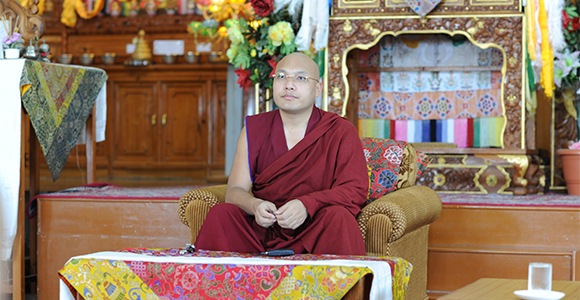30 June 2013 – Gyuto Monastery, Dharamsala
A few days after his 28th birthday the Gyalwang Karmapa delighted local students and devotees by giving an impromptu teaching at the request of students at Gyuto Monastery, his temporary residence. Although the teaching was unplanned, word had quickly spread and a crowd soon filled the gompa, eager to receive the Gyalwang Karmapa’s wisdom.
He began by thanking those gathered for taking interest in his recent birthday, and for their personal celebrations and aspiration prayers. “Apart from sublime, spiritually advanced individuals, for the rest of us as ordinary people in the world we are subject to the sufferings of birth, aging, sickness and death,” he said. “I personally see no need to celebrate my birthday as such, given that birth is, generally speaking, nothing but suffering. However, I still feel that I need to express a personal thank you to all of you and the many people who see my birthday as an occasion to make virtuous prayers and dedications.”
Following his regular custom, at the beginning of the teaching the Gyalwang Karmapa offered those gathered the oral transmission for the practice of Four-Armed Chenrezig. Describing this particular practice as being the practice of compassion itself, he then went on to teach extensively on compassion.
“What we call compassion is the wish or desire to be capable of protecting sentient beings from suffering,” he began. “We could call it a sense of determination, a sense of courage or resolve. That is compassion. It is not merely something intellectual that belongs to the brain or that sphere of our experience. But rather it is a powerful heartfelt feeling or quality, one that must be sincere. This is how I see it.”
Tying together the need for compassion with the reality of interdependence in our contemporary world, the Gyalwang Karmapa emphasized the links between others’ welfare and our own.
“Now in the 21st century we find ourselves in what we might call the information era,” he explained. “Within this era of information I would say that now more than ever the suffering of other beings really becomes part of our individual experience. This is not merely an idea, but rather it describes the actual reality of the world that we live in now. As we continue in this age of information we can see that our world is getting smaller and smaller and all of us within it are becoming closer and closer to one another. And so it should be increasingly evident that the experiences of other sentient beings are in fact part of our own individual experience.”
“This is not merely a notion or a concept, but rather it is a fact of our reality as we experience it now,” he continued. “Other beings’ suffering is part of our own individual experience. And this is true by virtue of the fact of our mutual dependence upon one another. Because we are mutually connected or interrelated, whatever impact there is on one individual in fact becomes an impact that affects all of us. So I think that in these terms compassion is an especially realistic way of relating to our existing situation in these times.”
The Gyalwang Karmapa then explained that compassion must begin with compassion for ourselves. Moreover, compassion should not allow for any sense of separation between ourselves and those we feel compassion for, but rather it should allow us to identify more closely with others.
“In order to develop our ability to feel compassion for others we need to begin with ourselves,” he said. “We need to consider at an individual level how we are oppressed by suffering. And that then becomes the model that serves as the basis for how we can expand our understanding of the quality of others’ experience, whether it be good or bad.”
“In looking at this relationship we are trying to develop compassion for someone else as the object of compassion,” he continued. “From our side, we’re the one who feels or cultivates that sense of understanding. But if we have the conception that we ourselves are in a good situation and we’re looking at someone else who is in an unfortunate situation, then there is a sense of separation there. We should not allow for that sense of separation to come between us and those that we feel compassion for. But rather, we should strive to feel that we are part of that person who is suffering, that we are sharing in their experience and in that way base our compassion on a strong sense of identification with that other individual.”



